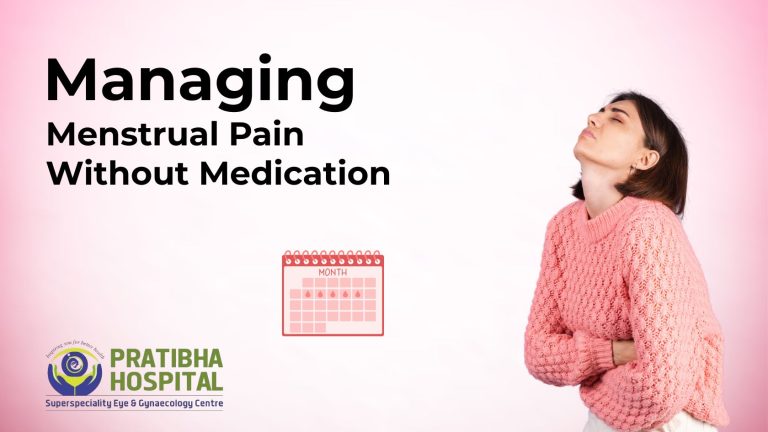Managing Menstrual Disorders with Pratibha Nutrition
Menstrual disorders affect many women, causing problems such as irregular cycles, heavy bleeding, and severe pain. Understanding these disorders is crucial for managing them effectively. Menstrual disorders can include conditions like painful periods (dysmenorrhea), heavy bleeding (menorrhagia), infrequent periods (oligomenorrhea), and absence of periods (amenorrhea). Premenstrual Syndrome (PMS) and its severe form, Premenstrual Dysphoric Disorder (PMDD), also fall under this category.
These disorders have various symptoms and causes. Symptoms can range from abdominal pain and fatigue to mood swings and excessive bleeding. Causes include hormonal imbalances, medical conditions like Polycystic Ovary Syndrome (PCOS) and thyroid problems, lifestyle factors such as stress and significant weight changes, and certain medications.
For women in Jalgaon, getting help from top gynecology hospitals like Pratibha Hospital is crucial. These hospitals provide expert care for managing menstrual disorders. Pratibha Hospital, for instance, offers advanced technology and a patient-centric approach, ensuring personalized care for each patient. Regular check-ups at these hospitals can help in early detection and effective management of menstrual disorders.
Additionally, adopting a healthy lifestyle can greatly aid in managing these disorders. This includes maintaining a balanced diet, regular exercise, managing stress, and getting enough sleep. Raising awareness and seeking timely medical advice are also important steps.
Menstrual disorders are a significant health concern that can impact daily life. Understanding their symptoms, causes, and treatments is essential. Women in Jalgaon should consider visiting top gynecology hospitals like Pratibha Hospital for expert care and management of these conditions. Regular check-ups and a healthy lifestyle can make a big difference in maintaining menstrual health.
Types of Menstrual Disorders
Painful Periods (Dysmenorrhea)
- What It Is- Painful cramps during menstruation.
- Symptoms- Severe lower abdominal pain, nausea, tiredness.
- Causes- Often caused by prostaglandins or conditions like endometriosis.
Heavy Bleeding (Menorrhagia)
- What It Is- Very heavy menstrual bleeding.
- Symptoms- Bleeding lasts more than seven days or needs frequent pad changes.
- Causes- Hormonal imbalances, fibroids, polyps, or bleeding disorders.
Infrequent Periods (Oligomenorrhea)
- What It Is- Having fewer menstrual periods.
- Symptoms- Less than six to eight periods a year.
- Causes- Polycystic ovary syndrome (PCOS), stress, significant weight changes.
No Periods (Amenorrhea)
- What It Is- Missing menstrual periods.
- Symptoms- No periods for three or more months.
- Causes- Pregnancy, menopause, stress, hormonal imbalances.
PMS and PMDD
- What It Is- PMS includes physical and emotional symptoms before menstruation; PMDD is a severe form of PMS.
- Symptoms- Bloating, mood swings, irritability, depression.
- Causes- Hormonal changes and neurotransmitter fluctuations.
Causes of Menstrual Disorders
Menstrual disorders can be caused by various factors that affect the normal functioning of a woman’s menstrual cycle. One major cause is hormonal imbalances. When the levels of hormones like estrogen and progesterone fluctuate, it can disrupt the regularity and flow of menstruation.
Medical conditions also play a significant role. For example, Polycystic Ovary Syndrome (PCOS) is a common condition that affects hormone levels and can lead to irregular periods. Thyroid problems can also interfere with menstrual cycles, as the thyroid gland regulates many body functions, including menstruation. Uterine fibroids, which are non-cancerous growths in the uterus, can cause heavy bleeding and pain during periods.
Lifestyle factors are another important cause. High levels of stress can affect the menstrual cycle, making periods irregular or more painful. Significant changes in weight, whether gain or loss, can also impact menstrual health. Excessive exercise, although beneficial in moderation, can sometimes lead to disruptions in the menstrual cycle due to the body’s physical stress.
Certain medications can also alter menstrual cycles. For instance, contraceptive pills are designed to regulate menstruation but can sometimes cause irregularities. Blood thinners and other medications can affect the frequency and flow of periods, leading to changes that might need medical attention.
Diagnosis and Treatment
Proper diagnosis is important for effective treatment. Common diagnostic methods include-
- Medical History and Physical Exam- Initial checks to understand symptoms.
- Blood Tests- To measure hormone levels.
- Ultrasound- Imaging to spot abnormalities.
- Endometrial Biopsy- Sampling the uterine lining for further analysis.
Treatment varies based on the disorder and cause-
- Medications- Pain relief for cramps, hormonal treatments to regulate cycles, antidepressants for PMDD.
- Surgery- Procedures like removing fibroids or polyps, and endometrial ablation for heavy bleeding.
- Lifestyle Changes- Managing stress, a healthy diet, and regular exercise can help.
- Alternative Therapies- Options like acupuncture, herbal supplements, and yoga.
Top Gynecology Hospitals in Jalgaon
For women in Jalgaon, finding the right hospital is key. Pratibha Hospital is one of the top gynecology hospitals in Jalgaon, known for its expert care in treating menstrual disorders. Here’s why it stands out
- Experienced Team- Led by Dr. Shradha C. Patil, they provide top-notch care.
- Advanced Technology- Modern equipment ensures accurate diagnosis and treatment.
- Patient-Centric Care- Personalized plans cater to individual needs for better outcomes.
Other top gynecology hospitals in Jalgaon also offer specialized care, using state-of-the-art facilities and experienced gynecologists. Regular visits to these hospitals can help detect and treat menstrual disorders early.
Importance of Regular Check-Ups
Regular gynecological check-ups are crucial for menstrual health. They help in-
- Early Detection- Spotting potential problems early.
- Monitoring Conditions- Keeping track of existing disorders.
- Preventive Care- Advice on lifestyle changes and preventive measures.
Managing Menstrual Disorders
Living with menstrual disorders can be tough, but these tips can help-
- Healthy Diet- Eat foods rich in iron, vitamins, and minerals.
- Regular Exercise- Helps reduce pain and improve mood.
- Stress Management- Techniques like meditation and deep breathing can help.
- Adequate Sleep- Getting enough rest is important.
- Support Systems- Talking to friends, family, or support groups can provide relief.
Raising Awareness
Talking openly about menstrual disorders is crucial for breaking the stigma surrounding them. When we discuss these issues openly, it encourages more women to speak up about their experiences, reducing feelings of shame or embarrassment. Educational efforts play a key role in this process.
- Break Stigma- Open discussions about menstrual health normalize the topic and help dismantle the cultural taboos. When people talk freely about menstrual disorders, it reduces the stigma and promotes a more accepting attitude toward these natural health issues.
- Inform- Providing accurate information about menstrual disorders is essential. Educational initiatives can inform women about the different types of menstrual disorders, their symptoms, and potential treatments. This knowledge empowers women to recognize when something is wrong and understand that they are not alone.
- Empower- Knowledge is power. By educating women about menstrual health, we empower them to seek medical help when needed. Women who are well-informed about their health are more likely to advocate for themselves, ask the right questions, and seek appropriate treatment. This empowerment leads to better health outcomes and improved quality of life.
Openly discussing menstrual disorders helps break the stigma, spread accurate information, and empower women to take control of their health. Educational efforts are vital in promoting these open conversations and ensuring women have the knowledge and confidence to seek the care they need.
Conclusion
Menstrual disorders are a significant aspect of women’s health that requires proper attention and care. These disorders can greatly affect a woman’s daily life and overall well-being. To effectively manage these conditions, it is essential to understand the different types, their causes, and available treatments. For women living in Jalgaon, seeking help from top gynecology hospitals, such as Pratibha Hospital, can provide access to high-quality care. Regular gynecological check-ups, adopting healthy lifestyle habits, and staying informed about menstrual health are crucial steps in maintaining well-being. Women experiencing menstrual disorders should seek medical advice promptly from the top gynecology hospitals in Jalgaon. Early intervention can significantly improve their quality of life and health outcomes.



